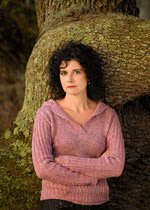Bev is a brilliant writer, and you should check out her blog on training for a marathon at the age of...um...over twenty-one...at One More Time, Bev for sheer entertainment value. If anyone can write a novel without pesky things like verbs, Bev can. However, mere mortals like you and me, dear readers...we should leave such projects to
I see a common flaw when I review manuscripts that are nearly, but not quite, ready for publication. The narrative feels flabby, and flabbiness often has its roots in the overuse of descriptors. Excess adjectives and adverbs are like fat. They obscure the lean muscularity of your prose. They jiggle when your story walks.
With that metaphor in mind, compare these two sentences:
"The saggy skin of her face hung loosely down her neck, floppy and pale."
"Her jowls jiggled when she walked."
Now, that first sentence isn't really terrible. It might even work, in the right story, provided the sentences in the immediate vicinity weren't equally flabby. It also might work if I cut out two of these four words: "saggy," "loosely," "floppy," or "pale."
But the second sentence jiggles. You can feel the motion of this large person. This sentence sets up a host of possibilities for characterization. Is she trudging through life, weighed down by burdens and by her very own body? Or is she upbeat, striding through this world and doing what must be done, aware that strangers sneer at her floppy jowls? I, for one, want to know.
When you edit your first draft, do a complete read-through with an eye toward word choice, particularly verbs and nouns. A sentence can exist without adverbs, adjectives, conjunctions, interjections, and prepositions, but it ain't a sentence without a verb and (almost always) a noun. (Despite what Bev says.)
Never miss the opportunity to trade a weakly modified noun like "saggy skin" for "jowls." And never miss the opportunity to trade a flabby verb for a verb that jiggles.















The visualization makes these excellent points easier to remember.
ReplyDeleteThe 'jiggling jowls' will remain with me for a long time.
Mary
Giggles and Guns
You've hit the nail on the head, Mary, because visualization is so important as a tool to make a fictional world feel real to a reader. Next, a writer has to move on to making that world sound real and taste real and smell real...
ReplyDeleteHi, Mary Anna. SO GLAD you have confidence in the development of my new genre: Work without Verbs. We have too many words. Most need to go. Might has well be those pesky verbs. They're so arrogant, always telling us what to do, like they are in charge of action. Gimme a break.
ReplyDeleteSeriously, I LOVE that you're promoting the abolition of writing I call "Word Salad." When I edit a book, I am satisfied only when the work is handsome and spare ... and each word is doing its job without help from 800 of its best friends.
Stay on the mission, girl! THANKS!!!
My mission is now clear: No more word salad!
ReplyDeleteMy writing will be meaty and spicy, like sausage!
Who's with me???
I'm with ya! But I also love those 800 best friends! I guess the saying is true; quality over quantity! Bye best friends!
ReplyDeleteCount me in. Jiggly verbs!
ReplyDeleteAnd jowly nouns!!!!
ReplyDelete